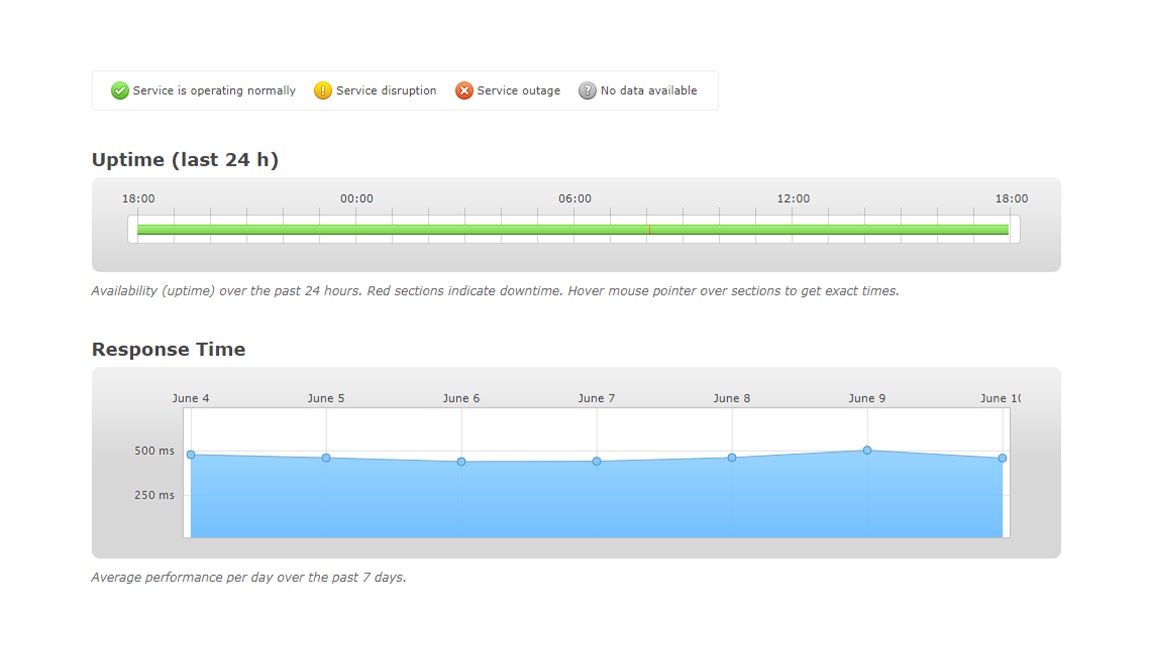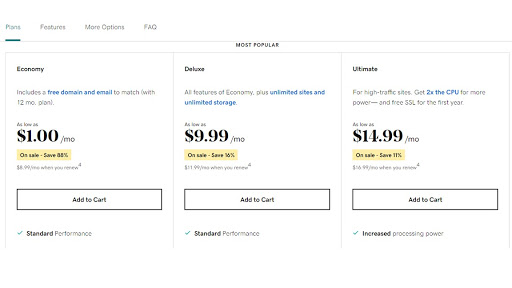Bluehost vs GoDaddy: Which hosting provider is better?
We compare two hosting giants, Bluehost and GoDaddy, to see which is best

Here at Tom’s Guide our expert editors are committed to bringing you the best news, reviews and guides to help you stay informed and ahead of the curve!
You are now subscribed
Your newsletter sign-up was successful
Want to add more newsletters?

Daily (Mon-Sun)
Tom's Guide Daily
Sign up to get the latest updates on all of your favorite content! From cutting-edge tech news and the hottest streaming buzz to unbeatable deals on the best products and in-depth reviews, we’ve got you covered.

Weekly on Thursday
Tom's AI Guide
Be AI savvy with your weekly newsletter summing up all the biggest AI news you need to know. Plus, analysis from our AI editor and tips on how to use the latest AI tools!

Weekly on Friday
Tom's iGuide
Unlock the vast world of Apple news straight to your inbox. With coverage on everything from exciting product launches to essential software updates, this is your go-to source for the latest updates on all the best Apple content.

Weekly on Monday
Tom's Streaming Guide
Our weekly newsletter is expertly crafted to immerse you in the world of streaming. Stay updated on the latest releases and our top recommendations across your favorite streaming platforms.
Join the club
Get full access to premium articles, exclusive features and a growing list of member rewards.
If you’re looking for the best web hosting services, you’ll most likely come across two popular names: Bluehost and GoDaddy. Bluehost powers over two million websites, while GoDaddy, often touted as the world’s largest domain registrar, hosts more than five million websites. Both also offer two of the best website builders.
Each of these providers has its strengths, and knowing which one to choose to establish your online presence can be tricky.
In this feature, we’ll pit Bluehost vs GoDaddy. We’ll help you decide which one best fits your needs by comparing them based on their features, pricing, performance, and customer support.
Bluehost: excellent features and inexpensive hosting
Bluehost is top of our list of the best web hosting services thanks to its high-performance and varied range of hosting packages, with top-performing servers meaning load speed is never an issue. Shared hosting starts at just $4.95 a month (for a 36-month plan) with 50GB of storage and unmetered bandwidth.
GoDaddy: Ideal for high-traffic and ecommerce sites-
GoDaddy is perfect for those with high-traffic websites as well as those with advanced ecommerce sites, and provides the best speeds. In turn, its uptime guarantee makes it a reliable choice of hosting provider, alongside strong support and extra features.
Bluehost vs GoDaddy: Features

At a glance, both Bluehost and GoDaddy seem to offer the basic features you would expect from a good web host: free domain, unmetered bandwidth, website migration, and storage space. However, there are some key differences worth noting.
With a third of all websites running on WordPress, there’s a decent chance you’ll use it, whether for blogging or building an ecommerce site. Both Bluehost and GoDaddy claim to offer the best WordPress hosting features.
GoDaddy makes it easy for you to get your WordPress site off the ground through its ready-to-use customizable themes. However, WordPress hosting is an area where Bluehost slightly edges GoDaddy.
As one of the three hosts recommended for WordPress hosting by WordPress, Bluehost has a WordPress-centric dashboard, allowing you to manage your site with ease. It also includes essential features such as WordPress themes, a WP staging environment, and free WordPress migration. What’s more, Bluehost has a team of in-house WordPress experts who are on standby 24/7 to help you with any concerns.
Get instant access to breaking news, the hottest reviews, great deals and helpful tips.
Both Bluehost and GoDaddy offer a free SSL (secure sockets layer) certificate, which ensures the security of your site by encrypting the data being transferred to and from the site with 256-bit encryption. In addition, both companies provide automatic WordPress updates with the latest security features.
But Bluehost also goes the extra mile when it comes to the security of your website. It has two-factor authentication, making it difficult for hackers to access your account.
Another feature worth highlighting is Bluehost’s integration with Sitelock–an automatic monitoring tool that detects suspicious activity, and prevents your website from landing on search engine blacklists.
If you already have a web host, then you need to consider website migration when selecting a new hosting provider. Bluehost offers a professional website migration service at a one-time fee of $149.99, which can switch up to five websites and 20 email accounts.
Even though Bluehost's website migration is not free, it's a completely hands-off and seamless process: you don't need to manually transfer files.
GoDaddy, on the other hand, offers free website migration. The only challenge with their offer is that you'll have to manually download your website's file from your previous hosting provider, and upload it to GoDaddy's servers–a process that can be frustrating, especially if you are not tech savvy.
Bluehost vs GoDaddy: Performance

One key metric to consider when looking at the performance of hosting providers is speed. A slow-loading page is the easiest way to drive customers away and discourage them from coming back.
We used Pingdom to monitor the speed of Bluehost and GoDaddy over a six-month period: from January 2021 to June 2021. Bluehost averaged a website response time of 773 ms. GoDaddy, on the other hand, performed significantly better, averaging a response time of 531 ms.
Another important performance consideration when choosing a web host is uptime. If your website continually experiences downtime, it will affect your conversion rates and brand reputation.
GoDaddy offers a 99.99% uptime guarantee, which means that the maximum downtime you should experience in a month is around four minutes. If your downtime is more than that figure, you can contact them and request a credit of 5% of your monthly hosting fee for that month.
Unfortunately, Bluehost doesn't offer any uptime guarantees. However, the company promises to solve any uptime problems within 15 minutes, except in extreme cases.
Bluehost vs GoDaddy: Support

When it comes to customer support, there’s very little difference between Bluehost and GoDaddy. GoDaddy’s help center has a comprehensive collection of articles, how-to guides, how-to videos, and FAQs to help you solve any issues. Bluehost also has a vast knowledge base with an intuitive search button, to help users find information quickly.
Both providers have an active community/members' forum, where you can meet, learn from, and interact with other users.
For more technical issues, you can contact their customer service representatives via email, phone, and live chat. We tested both providers’ live chat and email, and the responses were prompt and helpful.
Bluehost vs GoDaddy: Pricing and plans

Bluehost’s most popular plan is the shared hosting package, which starts at a promotional price of $2.75 a month for a 12 month contract. However, when renewing that offer, you’ll be required to pay the regular rate of $8.99. Each plan comes with a free CDN (content delivery network), an SSL certificate, and a free domain name, which can help you save startup costs.
GoDaddy, on the other hand, offers three shared hosting plans: economy, deluxe, and ultimate. The economy plan starts at a mouthwatering $1, but like Bluehost’s basic package, the price reverts to $8.99 when you want to renew.
For high-traffic sites, both providers offer hosting services including VPS (virtual private server) hosting and dedicated hosting. Bluehost’s VPS hosting starts at $18.99 a month, while GoDaddy’s starts at $19.99 a month. However, GoDaddy’s offer has a higher SSD (solid state disk) storage and RAM (random access memory).
Each hosting provider has some special plans you can consider, especially if you are building a business website. Bluehost offers WooCommerce hosting backed by a suite of ecommerce tools, security, and expert guidance, starting at $12.95 a month. GoDaddy also has a business hosting package with private-server speed and cPanel simplicity, starting at $19.99 a month.
Overall, we observed that both providers have competitive plans and prices. It’s worth noting that Bluehost has discounts on almost all its plans, although you'll need to pay for a subscription for one to three years to get a discount.
Bluehost vs GoDaddy: Verdict
At the end of the day, it’s difficult to say for sure which hosting provider is the best. True, Bluehost edges GoDaddy in many of the criteria we considered. However, most of those differences are marginal.
Ultimately, your choice of a provider depends on your needs. Bluehost, because of its excellent hosting plans at affordable prices, is perfect for anyone who wants to create a business website, blog, or an ecommerce site.
As an official WordPress partner, Bluehost is your best bet if you are looking at creating a WordPress website. However, be wary of steep renewal prices.
We recommend GoDaddy for high-traffic Joomla sites and advanced ecommerce sites like Magento. If you are keen on speed, GoDaddy would be a great choice. GoDaddy’s uptime guarantee also makes it a reliable choice for web hosting.
Further reading on web hosting
If you want to examine other web hosts before making a choice, check out our guide to the best cheap web hosting deals. You can also view our other web hosting comparison feature, which compares Bluehost vs HostGator; or our wider versus guide that analyzes web hosting vs WordPress vs website builders.
Wisdom Elikem Sablah is a B2B, SaaS consultant and freelance writer. He combines a background in mathematics, data science, and digital marketing with a knack for storytelling. He writes for top publications, including TechRadar, Tom's Guide, and CreativeBloq.
 Club Benefits
Club Benefits













